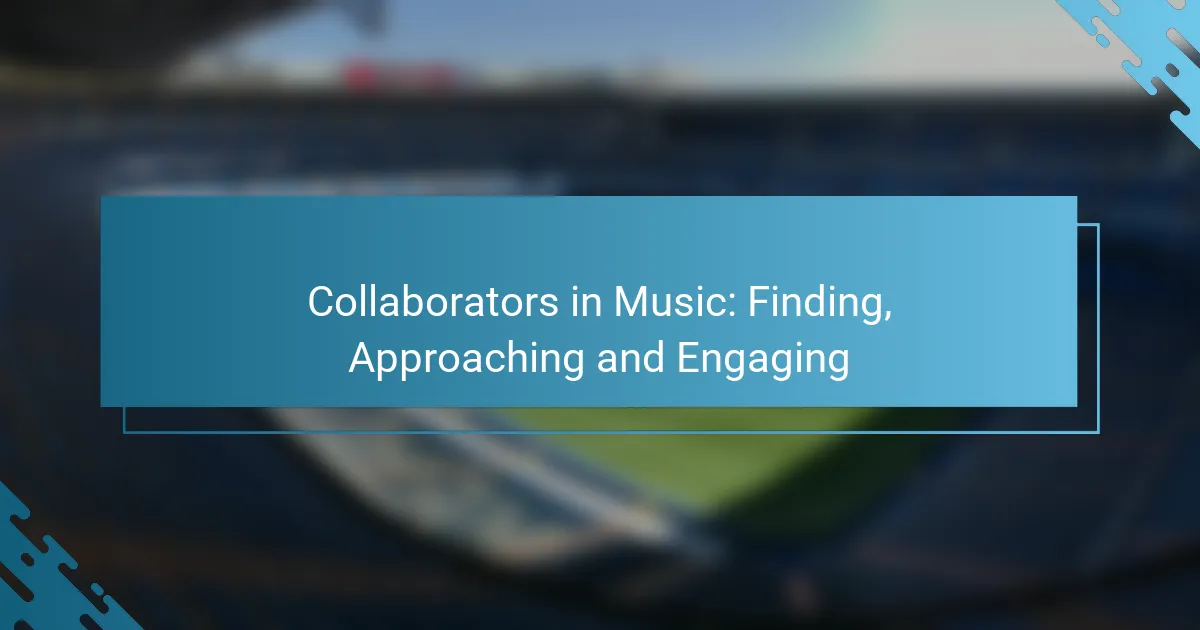Collaborating in music can significantly enhance creativity and lead to innovative projects. To find the right partners, it’s essential to identify individuals or groups that align with your artistic vision and style. Engaging effectively with potential collaborators through personalized communication and showcasing your work can foster meaningful connections and successful partnerships.
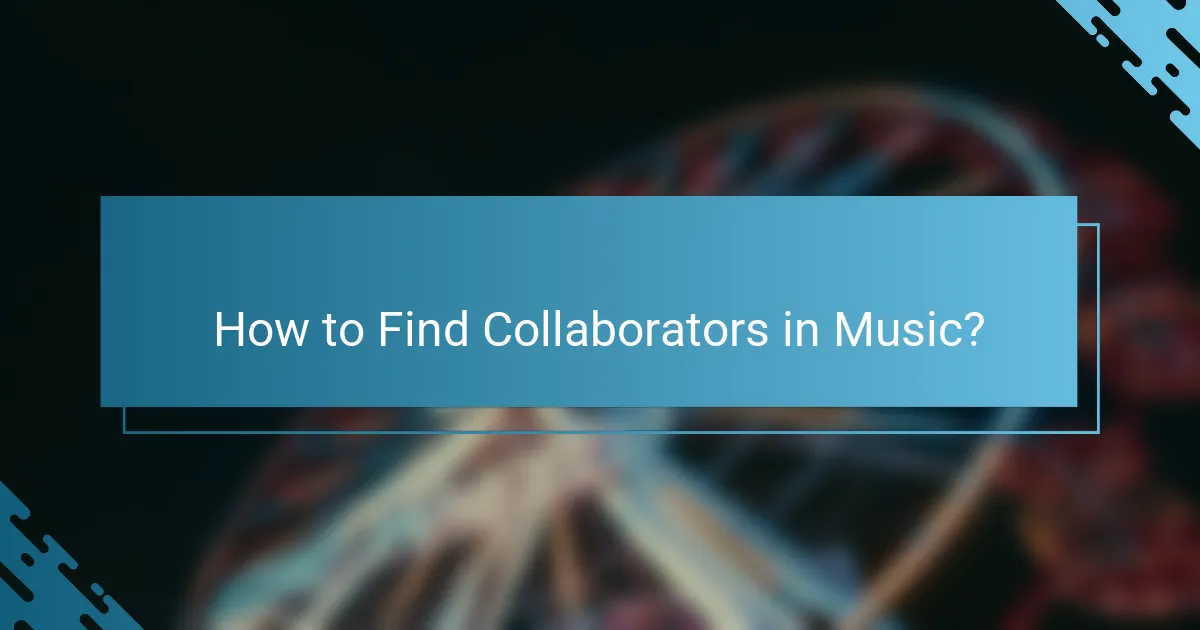
How to Find Collaborators in Music?
Finding collaborators in music involves identifying individuals or groups that complement your style and vision. Effective collaboration can enhance creativity and lead to innovative projects, so it’s essential to explore various avenues for connecting with potential partners.
Networking at Music Events
Attending music events such as concerts, festivals, and industry conferences is a great way to meet potential collaborators. Engage with artists, producers, and other musicians to build relationships and share your work. Remember to bring business cards or digital portfolios to showcase your music.
Consider participating in workshops or panels where you can interact with like-minded individuals. These settings often foster collaboration and can lead to fruitful partnerships.
Using Social Media Platforms
Social media is a powerful tool for finding collaborators in music. Platforms like Instagram, Twitter, and TikTok allow you to showcase your work and connect with other musicians. Use relevant hashtags to reach a wider audience and engage with posts from artists you admire.
Join groups or forums on platforms like Facebook or Reddit dedicated to music collaboration. These communities often share opportunities and can help you find individuals looking for partnerships.
Exploring Online Collaboration Tools
Online collaboration tools such as Soundtrap, BandLab, and Splice enable musicians to work together remotely. These platforms allow you to share tracks, edit music, and provide feedback in real-time, making it easier to collaborate regardless of location.
When using these tools, ensure you have a clear agreement on project goals and contributions to avoid misunderstandings. Familiarize yourself with the platform’s features to maximize your collaborative experience.
Joining Music Communities
Joining local or online music communities can significantly expand your network. Look for meetups, local music groups, or online forums where musicians gather to share ideas and collaborate. Engaging in these communities can lead to valuable connections.
Participate actively by sharing your music, providing feedback to others, and attending community events. This involvement can help you establish a reputation and attract potential collaborators.
Leveraging Music Industry Contacts
If you have existing contacts in the music industry, leverage these relationships to find collaborators. Reach out to producers, managers, or fellow musicians who may know others looking to collaborate. Personal recommendations can often lead to fruitful partnerships.
Consider attending industry networking events or workshops to meet new contacts. Building a solid network can open doors to collaboration opportunities that may not be publicly advertised.
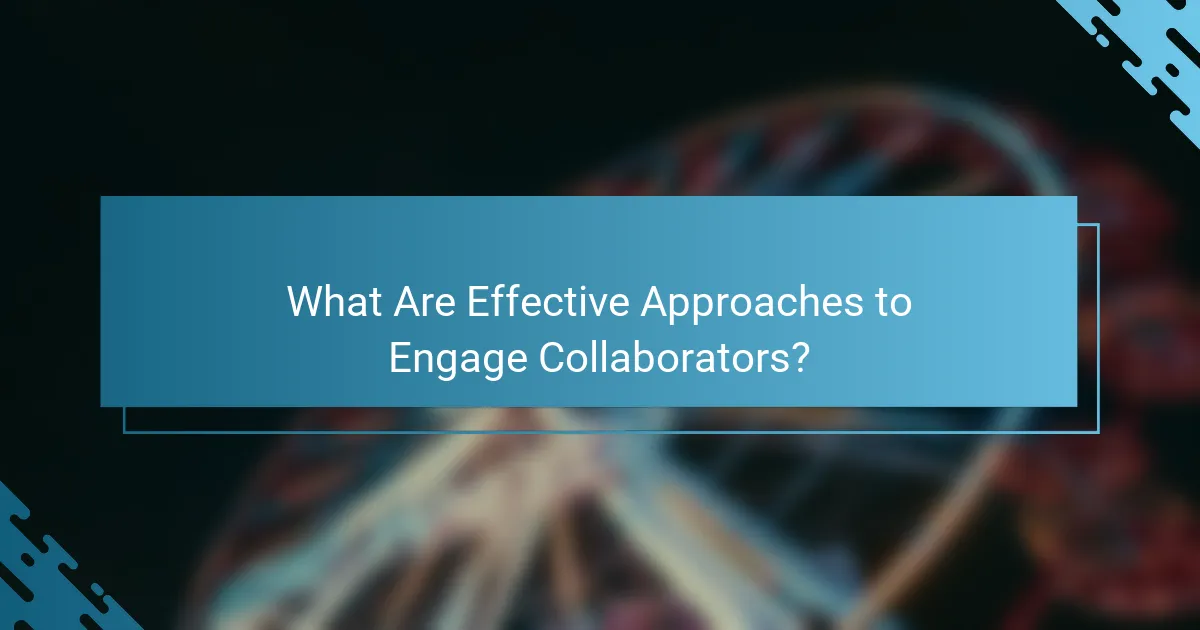
What Are Effective Approaches to Engage Collaborators?
Effective approaches to engage collaborators involve personalized communication, showcasing your work, highlighting mutual benefits, and fostering informal connections. These strategies help build rapport and increase the likelihood of successful partnerships in the music industry.
Personalized Outreach Messages
Crafting personalized outreach messages is crucial for engaging potential collaborators. Tailor your communication to reflect the recipient’s style, interests, and previous work, which shows genuine interest and effort.
For example, mention a specific project of theirs that resonates with you or how your styles align. Avoid generic templates, as they can come off as insincere and reduce your chances of a positive response.
Showcasing Previous Work
Demonstrating your previous work is essential in attracting collaborators. Create a portfolio that highlights your best projects, showcasing your unique style and skills.
Consider using platforms like SoundCloud or Bandcamp to share your music. Include links in your outreach messages to provide easy access, allowing potential collaborators to quickly assess your capabilities.
Offering Mutual Benefits
Highlighting mutual benefits is key to engaging collaborators effectively. Clearly outline what both parties stand to gain from the partnership, whether it’s exposure, shared resources, or creative growth.
For instance, if you have a strong social media following, mention how collaborating could help both of you reach new audiences. This approach fosters a sense of teamwork and shared goals.
Scheduling Informal Meetings
Scheduling informal meetings can help establish a personal connection with potential collaborators. Opt for casual settings, like coffee shops or virtual chats, to create a relaxed atmosphere for discussion.
Use these meetings to explore ideas, share visions, and gauge compatibility. Keep the conversation light and engaging, focusing on building a rapport rather than formal pitches, which can feel restrictive.
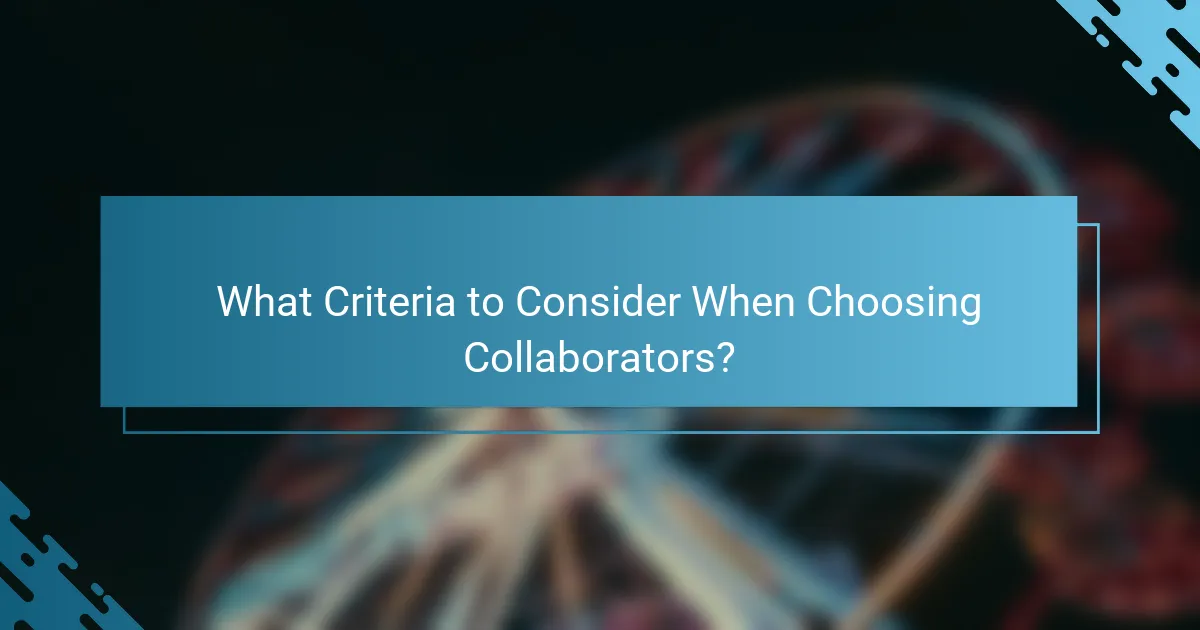
What Criteria to Consider When Choosing Collaborators?
Choosing collaborators in music involves evaluating several key criteria to ensure a successful partnership. Factors such as musical compatibility, experience, skill level, and industry reputation play crucial roles in determining the right fit for your project.
Musical Compatibility
Musical compatibility is essential for a productive collaboration. It refers to how well your musical styles, genres, and creative visions align. For instance, if you primarily create electronic music, collaborating with a classical musician might require extra effort to bridge stylistic differences.
To assess compatibility, listen to potential collaborators’ previous work and consider how their sound complements yours. A good practice is to co-create a short piece together to gauge how well your styles mesh before committing to a larger project.
Experience and Skill Level
Experience and skill level significantly impact the collaboration’s outcome. Collaborators should ideally possess complementary skills that enhance the project. For example, if you’re a songwriter, partnering with a seasoned producer can elevate the production quality of your music.
When evaluating potential collaborators, consider their track record, including past projects and their roles in those projects. A musician with several years of experience may bring valuable insights and techniques that can enrich your work.
Reputation in the Industry
A collaborator’s reputation can influence your project’s visibility and credibility. Working with well-respected artists can open doors to new opportunities and audiences. Research their standing in the industry by checking their social media presence, press coverage, and collaborations with other notable musicians.
However, be mindful that a strong reputation doesn’t always guarantee a good working relationship. It’s crucial to ensure that their professional demeanor and work ethic align with your expectations to foster a positive and productive collaboration.
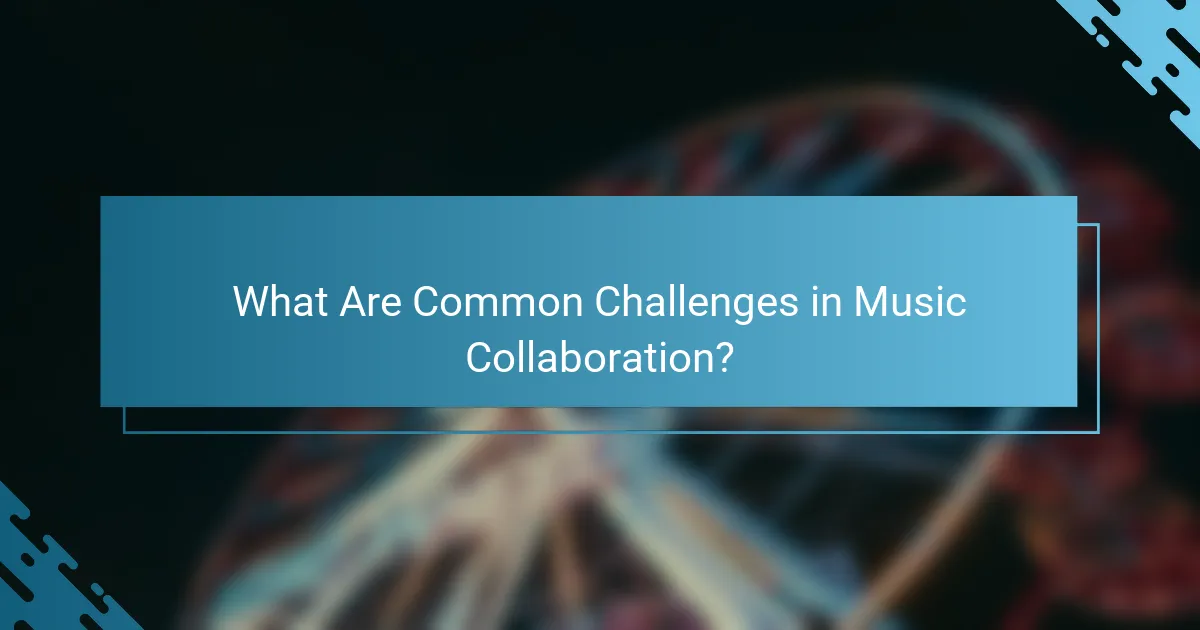
What Are Common Challenges in Music Collaboration?
Music collaboration often faces several challenges that can hinder creativity and productivity. Key issues include communication barriers, creative differences, and scheduling conflicts, each of which requires careful management to ensure a successful partnership.
Communication Barriers
Effective communication is crucial in music collaboration, yet it can be obstructed by differences in language, terminology, or even artistic vision. Misunderstandings can arise when collaborators do not share the same musical background or when they use jargon unfamiliar to others.
To overcome these barriers, establish clear communication channels from the start. Regular check-ins and open discussions about expectations can help clarify intentions and reduce confusion. Utilizing collaborative tools like shared documents or project management apps can also facilitate smoother interactions.
Creative Differences
Creative differences are common in music collaboration, as each artist brings their own style and vision. These differences can lead to tension if not managed properly, potentially stifling the creative process.
To navigate creative differences, encourage an environment of respect and openness. Consider setting aside time for brainstorming sessions where all ideas are welcomed, and establish a compromise framework to integrate diverse perspectives. This approach can lead to innovative outcomes that reflect the strengths of all collaborators.
Scheduling Conflicts
Scheduling conflicts can significantly impede music collaboration, especially when team members have varying commitments. Finding mutually convenient times for meetings or recording sessions can be challenging and may lead to delays in project timelines.
To mitigate scheduling issues, use shared calendars to identify available times and plan sessions well in advance. Prioritize flexibility and consider setting regular meeting times that accommodate everyone’s schedules. This proactive approach can help maintain momentum and ensure that all collaborators remain engaged throughout the project.
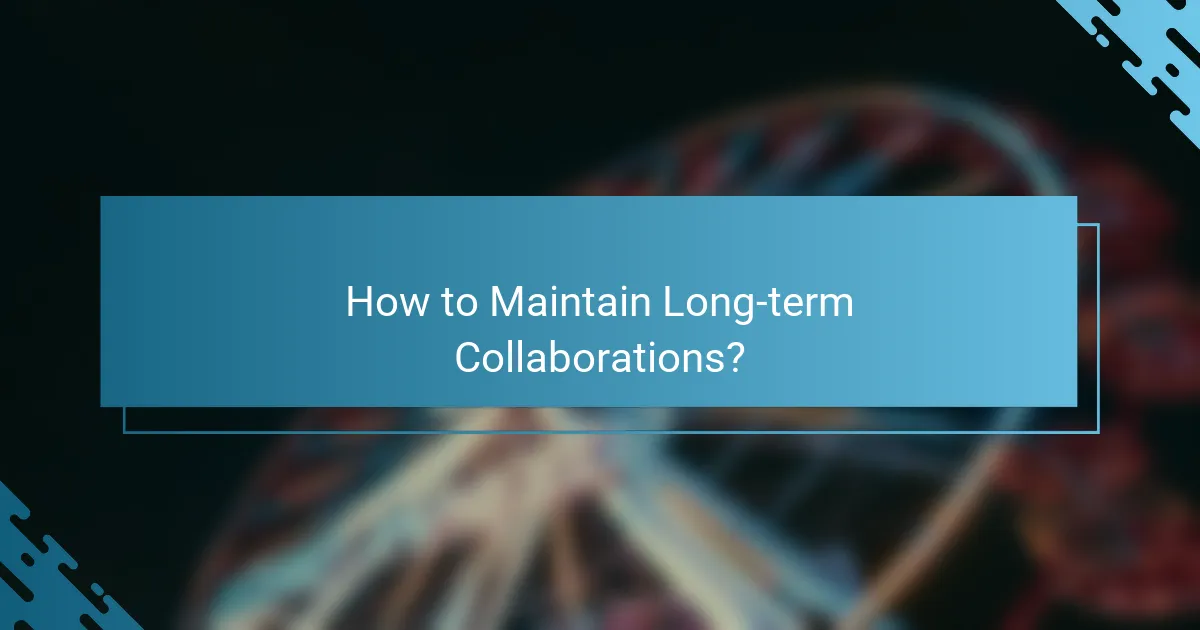
How to Maintain Long-term Collaborations?
Maintaining long-term collaborations in music requires consistent communication, clear expectations, and a shared vision. By fostering a supportive environment, collaborators can build trust and enhance their creative output over time.
Regular Check-ins
Regular check-ins are essential for sustaining collaborations. Schedule brief meetings or calls every few weeks to discuss progress, address concerns, and share feedback. This keeps everyone aligned and engaged in the project.
Consider using collaborative tools like Slack or Zoom for these check-ins. Aim for a 30-minute session to ensure discussions remain focused and productive.
Setting Clear Expectations
Clearly defined expectations help prevent misunderstandings and conflicts. Outline roles, responsibilities, and deadlines at the outset of the collaboration. This clarity allows each collaborator to understand their contributions and how they fit into the overall project.
Document these expectations in a shared file or agreement. Regularly revisit and adjust them as the project evolves to accommodate new ideas or changes in direction.
Sharing Creative Control
Sharing creative control fosters a sense of ownership among collaborators. Encourage each participant to contribute ideas and feedback throughout the creative process. This inclusivity can lead to innovative solutions and a richer final product.
Establish a balance where all voices are heard, but also set boundaries to avoid decision paralysis. Consider rotating leadership roles for different aspects of the project to ensure everyone feels valued and engaged.
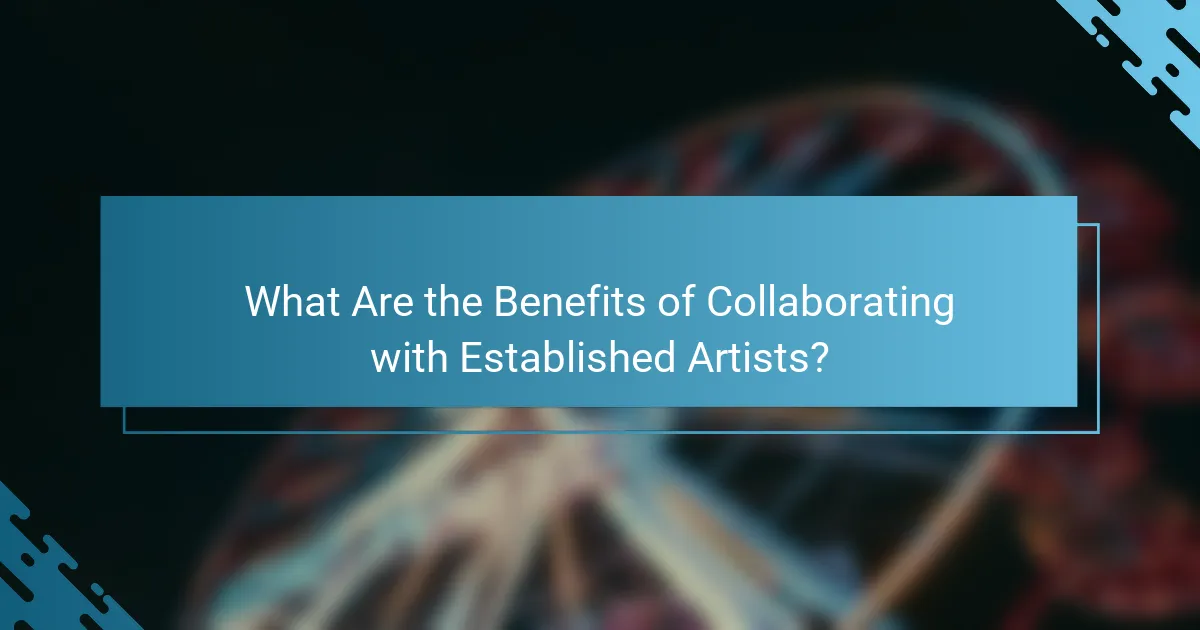
What Are the Benefits of Collaborating with Established Artists?
Collaborating with established artists can significantly enhance your visibility and credibility in the music industry. These partnerships often lead to increased exposure, access to new audiences, and opportunities for creative growth.
Enhanced Exposure and Reach
Working with well-known artists can introduce your music to their established fan base, greatly expanding your audience. This exposure can lead to more streams, downloads, and social media followers, which are crucial for emerging artists.
For example, a collaboration might result in a feature on a popular artist’s album or a joint performance at a major festival. These opportunities can elevate your profile and lead to further collaborations.
Creative Growth and Learning
Collaborating with experienced musicians allows you to learn from their techniques and insights. This exchange can inspire new ideas and help you refine your own style.
Consider how working with a seasoned producer can improve your songwriting or arrangement skills. Engaging with different genres through collaboration can also diversify your musical repertoire.
Networking Opportunities
Partnerships with established artists often open doors to valuable industry connections. These relationships can lead to introductions to managers, agents, and other collaborators who can further your career.
Attending events or sessions with well-known artists can help you build a network that is essential for long-term success in the music business. Make sure to follow up with new contacts to maintain these relationships.
